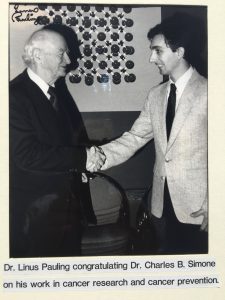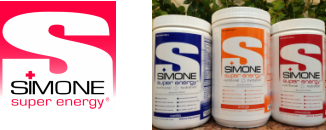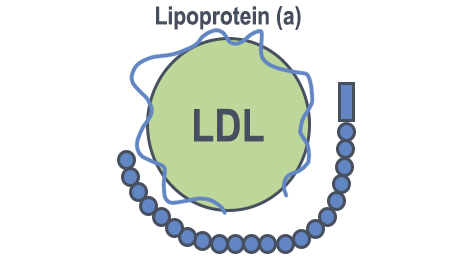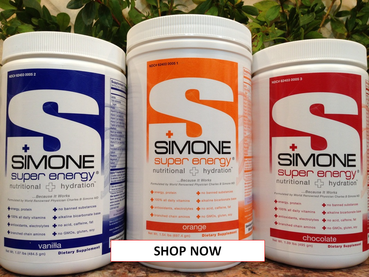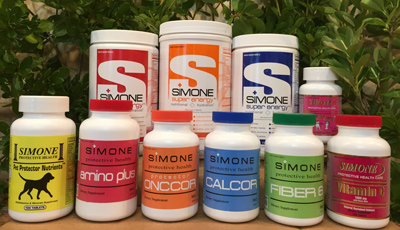We do not diagnose disease or recommend a dietary supplement for the treatment of disease. You should share this information with your physician who can determine what nutrition, disease and injury treatment regimen is best for you. You can search this site or the web for topics of interest that I may have written (use Dr Simone and topic).
“We provide truthful information without emotion or influence from the medical establishment, pharmaceutical industry, national organizations, special interest groups or government agencies.” Charles B Simone, M.MS., M.D.
LIPOPROTEIN (a) is LOWERED BY NICOTINIC ACID (a form of niacin), ASPIRIN, and VITAMIN C
Lawrenceville, NJ (Dr Simone) – High lipoprotein(a), Lp(a), found in 20% of people’s blood is a risk factor for coronary heart disease (CHD), cardiovascular disease (CVD) including aortic stenosis, atherosclerosis, thrombosis, stroke, cancer, and diabetes mellitus. Lipoprotein(a) above 30 mg/dl doubles the risk of CHD, and if LDL is also elevated the risk is increased by a factor of 5 (that’s 500%). Lipoprotein(a) can cause atherosclerosis without having a high cholesterol, high LDL, or high triglycerides, etc.
Lipoprotein(a) and LDL-cholesterol penetrate the inner layer of the arterial wall and accumulate together to form plaque. Lipoprotein(a) may be more strongly retained in the arterial wall than LDL. Lipoprotein(a) transports oxidized phospholipids that are inflammatory. Experimental data suggest that lipoprotein(a) may also promote clot formation in arteries that have plaque.
Nicotinic Acid (a form of niacin) and Aspirin are two relatively safe, easily available and inexpensive drugs known to significantly reduce the levels of lipoprotein(a); they should be used under the supervision of a qualified physician. Statin drugs do not lower lipoprotein(a) (Kostner et al. Circulation. 1989. 80:131-39; Khera et al. Circulation. 2014. 129:6354-52).
Nicotinic Acid (a form of niacin) lowers lipoprotein(a) by approximately 30 percent. [Boden WE, Sidhu MS, Toth PP (2014). “The therapeutic role of niacin in dyslipidemia management”. J. Cardiovasc. Pharmacol. Ther. 19 (2): 141–58. doi:10.1177/1074248413514481. PMID 24363242]. Therefore, the European Atherosclerosis Society (EAS) Consensus Panel has recommended niacin as the primary treatment for lowering elevated lipoprotein(a) levels. The therapeutic dose ranges from 1 gram to 3 grams per day.
ASPIRIN also lowers lipoprotein(a).
VITAMIN C (ascorbic acid) also lowers lipoprotein(a). The Linus Pauling protocol can lower lipoprotein(a): 6-18 grams/day Vitamin C (ascorbic acid), and 6 grams/day L-lysine. This protocol can reduce Lipoprotein(a) 2-5 fold over a few months. Vitamin C can reduce or prevent the development of atherosclerosis by lowering plasma lipoprotein(a), decreasing lipoprotein infiltration into the arterial wall, and preventing lipid peroxidation.
-
”Knowing that lipoprotein(a) attaches to the artery at the lysine binding sites forming atherosclerotic plaques, any physical chemist would say at once that to prevent that, put the amino acid lysine in the blood to a greater extent than it is normally to give lipoprotein(a) something else to attach.”
92 year old Linus Pauling, Ph.D.
-
Lysine oral food supplements increase the concentration of free lysine in the blood. The higher the concentration of the free lysine in the blood, the more likely lipoprotein(a) will bind with this lysine, rather than the lysine strands that have been exposed by cracks in blood vessels, or the other lysine that has been attracted to the lipoprotein(a) already attached to the blood vessel wall.
Curiously, IONIS Pharmaceuticals funded and published two studies in the highly respected journal, Lancet (Phase 2 and Phase 1/2) involving small numbers of patients showing that their drug (an antisense oligonucleotide) targeting apolipoprotein(a) can lower lipoprotein(a) [Viney et al. Lancet. November 5, 2016.388:2239-53 https://pubmed.ncbi.nlm.nih.gov/27665230/ ].
For which treatment will you ask your physician? The IONIS patented drug advertised to you directly on television that will cost a great deal of money, or the combination of Nicotinic acid, Aspirin, and Vitamin C that has a proven effectiveness and costs mere pennies?
(c) 2015 Charles B. Simone, M.MS., M.D.
